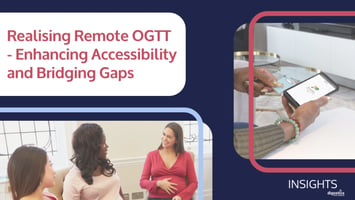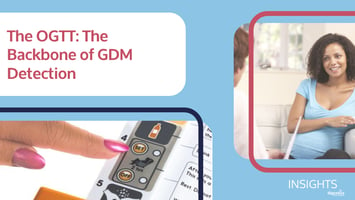Last week we were delighted to finally reveal the results of our exciting OGTT home testing...
Exploring the Endometriosis and Gestational Diabetes Nexus
.png?width=500&height=281&name=EndometriosisxGDM%20image%20(5).png)
March is Endometriosis Awareness Month and an opportunity to focus minds on an important but all too frequently neglected area of women’s health that impacts the lives of 1 in 10 girls and women of reproductive age worldwide¹.
What is Endometriosis?
Endometriosis sees tissue similar to the lining of the uterus grow outside of the womb, contributing to, among many other symptoms, debilitating pain during menstruation and sexual intercourse, and fertility challenges.
While there is currently no cure for the condition, early diagnosis can potentially slow down its progression. And yet, despite 190 million women¹ suffering each and every month, a lack of understanding of the condition and appreciation of its symptoms, together with the extreme complexity associated with both sourcing and providing a diagnosis, only serves to underscore why a month dedicated to raising the profile of endometriosis is so essential.
The challenge with diagnosis lies in the absence of reliable screening tools or tests that can predict and identify endometriosis effectively. It often depends on recognising patterns in a history of menstrual symptoms and chronic pelvic pain. Furthermore, women's health is a complex and multifaceted domain, often characterised by interconnections between various conditions that may seem disparate at first glance.
The Link Between Gestational Diabetes and Endometriosis
Two conditions that exemplify this interconnectedness are endometriosis and gestational diabetes mellitus (GDM), with the latter representing an area of women’s health in which Digostics is particularly invested, recently collaborating with University Hospital Southampton to deliver the world’s first GDM home screening programme. While endometriosis relates to the reproductive system and the other to pregnancy-related glucose intolerance, recent research suggests a much deeper relationship.
There is growing interest in understanding how endometriosis may affect pregnancy and the health of mothers and newborns. However, the link between endometriosis and GDM during pregnancy is still not fully understood.
Evidence suggests that chronic inflammation and prolonged exposure to certain immune substances called cytokines might increase the risk of developing GDM. Similarly, a woman’s susceptibility to GDM might also be attributable to the underlying inflammation associated with endometriosis. However, it's important to stress, that the available research findings can be influenced by other factors, such as the frequent need for women with endometriosis to undergo assisted reproductive technologies (ART), which on its own can increase the risk of GDM².
There's also a new idea proposed by evolutionary biologists that suggests endometriosis and polycystic ovary syndrome (PCOS), two conditions associated with GDM, represent extreme outcomes of variations in the development and activity of the hypothalamic-pituitary-gonadal axis, which is responsible for regulating reproductive hormones².
This hypothesis suggests that endometriosis might be influenced by lower levels of prenatal testosterone, while PCOS might be influenced by higher levels of prenatal testosterone. Interestingly, this theory predicts that women with PCOS and those with endometriosis might have opposite hormonal and metabolic characteristics, even during pregnancy².
The Importance of Taking a Joined-Up Approach to Women's Health
Understanding the link between endometriosis and gestational diabetes highlights the importance of taking a holistic approach to women's health. It also emphasises the interconnectedness of reproductive health, metabolic health, and overall well-being that requires healthcare providers to adopt a multidisciplinary perspective in diagnosing and managing these conditions. However, until we can deliver this kind of standard of care to all women, we must continue to get the message out via initiatives such as Endometriosis Awareness Month.
If you have been diagnosed with endometriosis or gestational diabetes, you can click on the following links for support and information:
References:
.png?width=50&name=Headshot%20PSD%20-%20Circular%20(6).png)




Leave a Comment